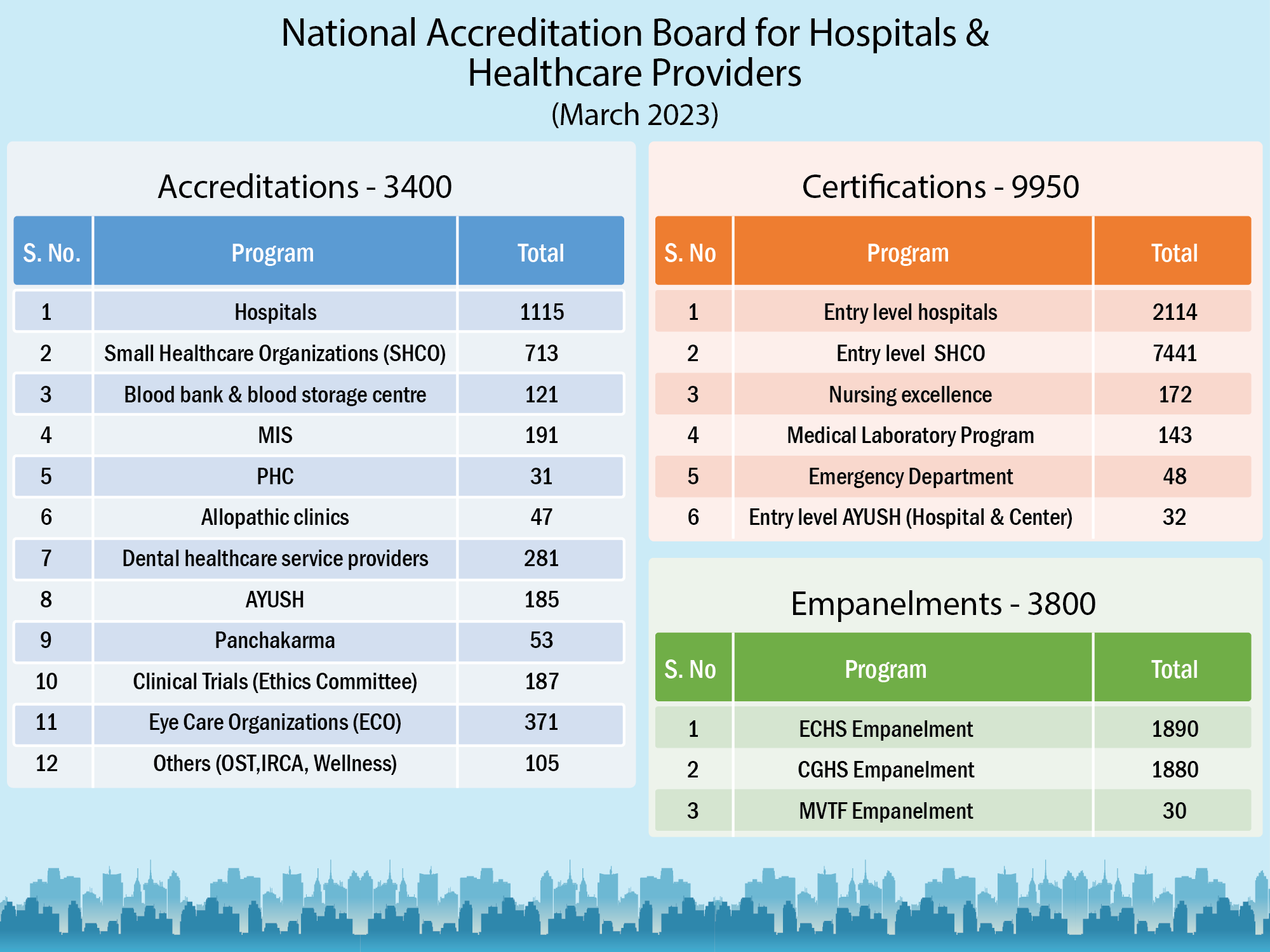Buyers Speak
Healthcare accreditations in India – A pursuit of excellence

Accreditation is the most important approach to improving the quality of healthcare organizations, and serves as a guiding force to drive these organizations to follow standardized procedures in order to ensure patient safety and quality by way of establishing systems, protocols, leading to a culture that is safe and patient centric. Though there are many benefits and beneficiaries of accreditation, patient is the biggest beneficiary among all the stakeholders. NABH was established to operate accreditation programs for hospitals and healthcare organizations with the objective of enhancing health system and promoting continuous quality improvement and patient safety. NABH has the mandate and remains committed to ensuring healthy lives and promote wellbeing for all at all ages (SDG-3-Target 2030), creating a culture and an ecosystem of quality in healthcare taking quality, safety, and wellness to the last in the line.
Ensuring quality is a very critical component of high-performing health systems. There is a general awakening on this topic throughout the world, which has prompted the need to improve in terms of actual patient care and patient safety, the quality of healthcare. India has likewise embraced the cause to the fullest extent possible, and is consistently committed to enhancing the obtaining of accreditation through organizations like NABH.
Accreditation, which is essentially a framework that assists healthcare organizations in establishing objective systems intended for patient safety and quality care, developed through a comprehensive approach to total quality management, has had a phenomenal impact on changing the healthcare landscape.
Accreditation in the context of healthcare refers to the formal evaluation procedure by means of self-assessment and external peer-review process, used by healthcare organizations to accurately assess their level of performance in relation to established standards, and to implement ways to improve the healthcare system continuously. Accreditation is the most important approach to improving the quality of healthcare organizations, and serves as a guiding force to drive these organizations to follow standardized procedures in order to ensure patient safety and quality by way of establishing systems, protocols, leading to a culture that is safe and patient centric. Accreditation is a systematic approach to do the rights things as per the right procedure to the right patient at the right time to have the right outcome. The patient is the biggest beneficiary of accreditation amongst all the stakeholders.
The primary goal and objective of accreditation is to demonstrate that the healthcare organization’s dedication to accreditation standards leads to a higher level of performance, and a stronger focus on patient care ,and to ensure that the healthcare organizations not only perform evidence-based practices but also give importance to access, affordability, efficiency, quality, and effectiveness of healthcare. Accreditation also helps in branding the country internationally as a cost-effective quality healthcare hub for foreign patients, and thereby caters to medical tourism to a larger extent making it a favorable destination for healthcare.
Strengths of accreditation
- The process of evaluation and accreditation is totally external to the organization opting for it and cannot be biased.
- Accreditation body uses consensus standards.
- Involves all the health professionals.
- The process is proactive and not reactive.
- Focuses on systems followed and unfollowed, and not on individuals.
- Organization-wide involvement.
- Periodic re-evaluation against standards helps in maintaining and sustaining the quality in the organization.
- Stimulates quality culture in the organization.
Benefits of accreditation
The improvement of services for all stakeholders, including patients, the general public, hospitals and its staff is facilitated through accreditation. Accreditation of a healthcare organization is majorly patient centric and aims to encourage patient safety as the overarching principle while providing care to patients. The clinical outcomes of a wide range of clinical conditions are improved through accreditation programs, which enhance the process of care delivered by healthcare services. The use of accreditation programs as a strategy to raise the caliber of healthcare services should be encouraged. Achieving accreditation requires holding staff to high standards for patient care. Studies have shown that accreditation improves the overall quality of care in healthcare facilities.
Benefits for patients
- The patient is the biggest beneficiary among all the stakeholders.
- Accreditation results in high quality of care and patient safety.
- The patients are serviced by credentialed medical staff.
- Rights of patients are respected and protected. Patient’s satisfaction is regularly evaluated.
Benefits for the organization
- Accreditation to a healthcare organization stimulates continuous improvement.
- It enables the organization in demonstrating commitment to quality care and patient safety, thereby ensuring best clinical outcomes.
- It raises community confidence in the services provided by the healthcare organization as services are provided by credentialed medical staff.
- It also provides opportunity to the healthcare unit to benchmark with the best.
- An accreditation status also provides marketing advantage in a competitive healthcare.
- The HCO standards, having been certified by ISQua, give an international recognition, which will also help to promote medical tourism.
- Finally, accreditation provides an objective system of empanelment by insurance and other third parties.
Benefits for staff
- The staff in an accredited hospital is a satisfied lot as it provides for continuous learning, good working environment, and leadership.
- Efficiencies and competencies of staff also get improved in an accredited Hospital.
- It improves overall professional development, knowledge, and competencies in systematic ways with defined ownership and accountability of all the staff, including medical and para medical staff.
 Benefits to paying and regulatory bodies
Benefits to paying and regulatory bodies
Finally, accreditation provides an objective system of empanelment by insurance and other third parties. Accreditation provides access to reliable and certified information on facilities, infrastructure, and level of care.
NABH accreditation – Creating an ecosystem of quality in healthcare
National Accreditation Board for Hospitals & Healthcare Providers, which is commonly abbreviated as NABH, is a constituent board of the Quality Council of India, which was set up in 2005 to establish and operate accreditation programs for hospitals and healthcare organizations with the objective of enhancing health system and promoting continuous quality improvement and patient safety. NABH is in its 18th year of creating an ecosystem of quality in healthcare, and has built itself as a national accreditation body over the years. NABH is structured to cater to the needs of the consumers and sets standards and benchmarks for the progress of the Indian health industry and provide a boost to the medical tourism. NABH stands for its values – credibility, responsiveness, transparency, and innovation in healthcare industry of the country and hence NABH accreditation is used as an empaneling criteria by various government organizations. NABH has given the country national standards or Desh ka Standard, which are in line with the vision of Atmanirbhar Bharat of our Hon’ble Prime Minister.
NABH, as an organization and NABH standards for hospitals, are internationally recognized and benchmarked. The accreditation of NABH standards for hospitals authenticates that NABH standards are in consonance with the global benchmarks set by ISQua, and thus hospitals accredited by NABH will have international recognition. Currently, NABH is offering around 25 accreditation, certification, and empanelment programs for various types and maturity levels of healthcare providers. NABH is the only accreditation body that has an accreditation system for traditional medicine worldwide. It has independent standards for Ayurveda, Yoga & Naturopathy, Unani, Siddha, and Homoeopathy. The standards are designed to facilitate ease of understanding and implementation. The healthcare industry has endorsed and adopted NABH in a big way. Today NABH is the largest healthcare provider accreditation body in our country with more than 17,000 healthcare organizations partnering with NABH under various accreditation, certification, and empanelment programs.
The reach of NABH in terms of the number of accredited hospitals is far more than other national and international private accreditation bodies, which have only around 50 to 60 hospitals empanelled under them in India. Also, the cost of investment for accreditation through these bodies is much higher and difficult for the healthcare providers at large in India. NABH is the only organization, which conducts surveillance and surprise assessments after the healthcare organization is accredited in order to maintain and ensure the continuity and sustainability of quality system. NABH conducts surveillance assessment after 2 years of accreditation and surprise assessment, as and when required, followed by renewal after 4 years.
NABH is working very closely and developing MoUs and partnerships with national governmental bodies like Ministry of Health, AYUSH, National Health Authority, National Commission for Homeopathy, other governmental, non-governmental, corporates, and NGOs. NABH is also actively contributing to the works and initiatives that our Hon’ble Prime Minister has announced. NABH is closely working on the government initiative under the Ministry of Health and Family Welfare for Heal in India, Heal by India project. NABH is an active member and part of the G-20 Health Working Group.
NABH is broadcasting the Quality Connect Podcast series in YouTube and other social media platforms, and is also working further to reach the grassroots level. In the coming months, NABH has planned extensively to conduct a mega quality campaign for awareness and sensitization among hospitals and general public about quality, patient safety, accreditation and certification processes in 2023. NABH is also conducting regular workshops, trainings, and awareness programs for the hospitals to spread awareness and train the hospitals for accreditation and certification processes so that they are not misled by external factors, consultancies, and agencies. NABH Program on Implementation (POI) is one of the very well-known and most pursued courses by the managers and leaders of hospitals, health administration students, and other healthcare professionals.
NABH has the mandate and remains committed to ensuring healthy lives and promote wellbeing for all at all ages (SDG-3-Target 2030), creating a culture and an ecosystem of quality in healthcare taking quality, safety, and wellness to the last in the line.
Outlook
Overall, the dream of a self-reliant quality health system is only possible when high-quality, affordable, and accessible health services are provided to all equitably, and NABH is committed to help the Hon’ble Prime Minister achieve this vision. There is a growing recognition of the importance of accreditation as a useful tool for patient safety, and more healthcare facilities are expected to seek accreditation in the coming years as patient expectations continue to rise and the healthcare system in India evolves.

The article is co-authored by Dr. Ebinesh Antony, Analyst, NABH.











